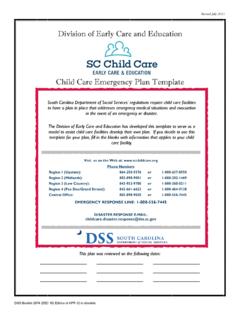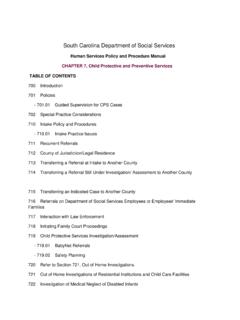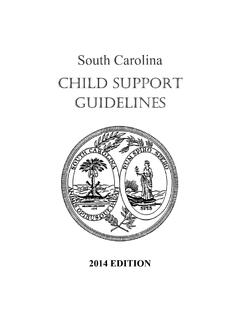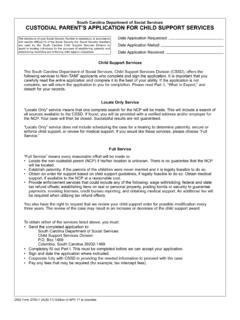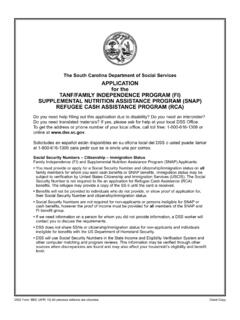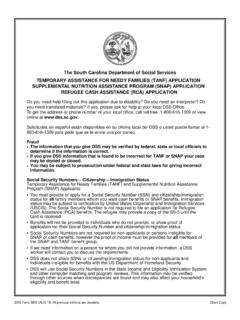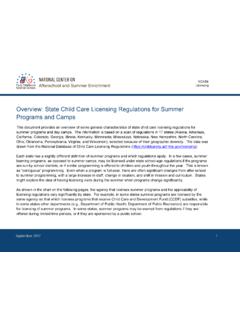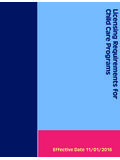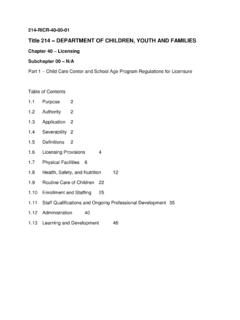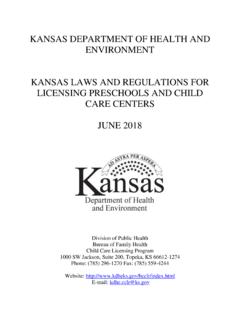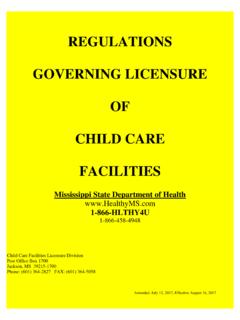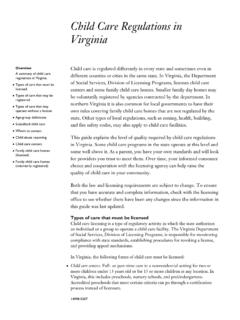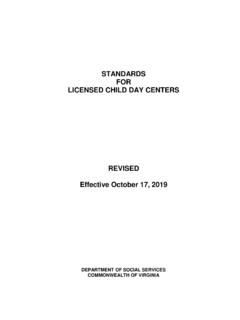Transcription of South Carolina Child Care Licensing Law
1 South Carolina Child care Licensing Law South Carolina Code of Laws, Title 63 (Children's Code), Chapter 13. Sections 63-13-10 through 63-13-1240. South Carolina Department of Social Services Division of Child care Licensing and Regulatory Services 1535 Confederate Ave. Columbia, SC 29201. DSS Booklet 2955 (NOV 15) Edition of MAR 09 is obsolete. DISCLAIMER. The South Carolina Legislative Council is offering access to the unannotated South Carolina Code of Laws on the Internet as a service to the public. The unannotated South Carolina Code on the General Assembly's website is now current through the 2014 session. The unannotated South Carolina Code, consisting only of Code text, numbering, and history may be copied from this website at the reader's expense and effort without need for permission. The Legislative Council is unable to assist users of this service with legal questions. Also, legislative staff cannot respond to requests for legal advice or the application of the law to specific facts.
2 Therefore, to understand and protect your legal rights, you should consult your own private lawyer regarding all legal questions. While every effort was made to ensure the accuracy and completeness of the unannotated South Carolina Code available on the South Carolina General Assembly's website, the unannotated South Carolina Code is not official, and the state agencies preparing this website and the General Assembly are not responsible for any errors or omissions which may occur in these files. Only the current published volumes of the South Carolina Code of Laws Annotated and any pertinent acts and joint resolutions contain the official version. Please note that the Legislative Council is not able to respond to individual inquiries regarding research or the features, format, or use of this website. However, you may notify the Legislative Services Agency at regarding any apparent errors or omissions in content of Code sections on this website, in which case LSA will relay the information to appropriate staff members of the South Carolina Legislative Council for investigation.
3 CHAPTER 13. Childcare Facilities ARTICLE 1. General Provisions SECTION 63-13-10. Purpose. (A) The intent of this chapter is to define the regulatory duties of government necessary to safeguard children in care in places other than their own homes, ensuring for them minimum levels of protection and supervision. Toward that end, it is the purpose of this chapter to establish statewide minimum regulations for the care and protection of children in childcare facilities, to ensure maintenance of these regulations and to approve administration and enforcement to regulate conditions in such facilities. It is the policy of the State to ensure protection of children under care in childcare facilities, and to encourage the improvement of childcare programs. (B) It is the further intent of this chapter that the freedom of religion of all citizens is inviolate. Nothing in this chapter shall give any governmental agency jurisdiction or authority to regulate, supervise, or in any way be involved in any Sunday school, Sabbath school, religious services or any nursery service or other program conducted during religious or church services primarily for the convenience of those attending the services.
4 (C) Nothing in this chapter shall create authority for the Department of Social Services to influence or regulate the curriculum of childcare facilities. HISTORY: 2008 Act No. 361, Section 2. SECTION 63-13-20. Definitions. For the purpose of this chapter: (1) Caregiver means any person whose duties include direct care , supervision, and guidance of children in a childcare facility. (2) Childcare means the care , supervision, or guidance of a Child or children, unaccompanied by the parent, guardian, or custodian, on a regular basis, for periods of less than twenty-four hours per day, but more than four hours, in a place other than the Child 's or the children's own home or homes. (3) Childcare center means any facility which regularly receives thirteen or more children for childcare. (4) Childcare facilities means a facility which provides care , supervision, or guidance for a minor Child who is not related by blood, marriage, or adoption to the owner or operator of the facility whether or not the facility is operated for profit and whether or not the facility makes a charge for services offered by it.
5 This definition includes, but is not limited to, day nurseries, nursery schools, childcare centers, group childcare homes, and family childcare homes. The term does not include: (a) an educational facility, whether private or public, which operates solely for educational purposes in grade one or above;. (b) five-year-old kindergarten programs;. (c) kindergartens or nursery schools or other daytime programs, with or without stated educational purposes, operating no more than four hours a day and receiving children younger than lawful school age;. (d) facilities operated for more than four hours a day in connection with a shopping center or service or other similar facility, where the same children are cared for less than four hours a day and not on a regular basis as defined in this chapter while parents or custodians of the children are occupied on the premises or are in the immediate vicinity and immediately available; however, these facilities must meet local fire and sanitation requirements and maintain documentation on these requirements on file at the facility available for public inspection.
6 (e) school vacation or school holiday day camps for children operating in distinct sessions running less than three weeks per session unless the day camp permits children to enroll in successive sessions so that their total attendance may exceed three weeks;. (f) summer resident camps for children;. (g) bible schools normally conducted during vacation periods;. (h) facilities for persons with intellectual disability provided for in Chapter 21, Title 44;. (i) facilities for the mentally ill as provided for in Chapter 17, Title 44;. (j) childcare centers and group childcare homes owned and operated by a local church congregation or an established religious denomination or a religious college or university which does not receive state or federal financial assistance for childcare services; however, these facilities must comply with the provisions of Article 9, and Sections 63-13-60 and 63-13-110 and that these facilities voluntarily may elect to become licensed according to the process as set forth in Article 3 and Sections 63-13-30, 63-13-40, 63-13-70, 63-13-80, 63-13-90, 63-13-100, 63-13-160, and 63-13-170.
7 (5) Childcare operator means the person, corporation, partnership, voluntary association, or other public or private organization ultimately responsible for the overall operation of a childcare facility. (6) Committee means the State Advisory Committee on the Regulation of Childcare Facilities, named under this chapter to advise the department on regulatory matters related to childcare facilities. (7) Complaint means a written statement reporting unsatisfactory conditions in a childcare facility. (8) Curriculum means and includes design of courses, teaching philosophy, methods, and activities. (9) Declaratory order means a written statement on the part of the department approving plans for construction or renovation ensuring against the imposition of more stringent regulations at a later date. (10) Deficiency correction notice means a written statement on the part of the department notifying a childcare facility which is not complying with any applicable regulations to correct the deficiencies stated in the notice within a reasonable time limit.
8 (11) Department means the State Department of Social Services, the agency designated to administer the regulation of childcare facilities under this chapter, with the advice of the State Advisory Committee on the Regulation of Childcare Facilities. (12) Director means the administrative head of the department. (13) Family childcare home means a facility within a residence occupied by the operator in which childcare is regularly provided for no more than six children, unattended by a parent or legal guardian, including those children living in the home and children received for childcare who are related to the resident caregiver. However, an occupied residence in which childcare is provided only for a Child or children related to the resident caregiver or only for the Child or children of one unrelated family or only for a combination of these children is not a family childcare home. (14) Group childcare home means a facility within a residence occupied by the operator which regularly provides childcare for at least seven but not more than twelve children, unattended by a parent or a legal guardian including those children living in the home and children received for childcare who are related to the resident caregiver.
9 However, an occupied residence in which childcare is provided only for a Child or children related to the resident caregiver or only for the Child or children of one unrelated family or only for a combination of these children is not a group childcare home. (15) Infant means a Child age twelve months or younger for the purposes of this chapter. (16) Minor Child means a person who has not reached the eighteenth birthday. (17) Private childcare facility means a facility as defined under item b. of this section which is not a public childcare facility, and which is able to be further classified as follows: (a) Entrepreneurial childcare facility means a facility whose childcare operator may receive public assistance funds directly or indirectly but which is managed as a profit-making business enterprise and whose corporation or private ownership is liable for payment of federal and state income taxes on profits earned by the facility. (b) Nonprofit childcare facility means a facility whose childcare operator may receive public assistance funds directly or indirectly but which is operated under the tutelage and control of a nonprofit or eleemosynary corporation, foundation, association, or other organization whose ownership may or may not be liable for payment of federal and state income taxes on profits earned by the facility.
10 (18) Provisional approval means a written notice issued by the department to a department, agency, or institution of the State, or a county, city, or other political subdivision approving the commencement of the operations of a public childcare center or group childcare home although the operator is temporarily unable to comply with all of the requirements for approval. (19) Provisional license means a license issued by the department to an operator of a private childcare center or group childcare home or a family childcare home which elects to be licensed authorizing the licensee to begin operations although the licensee temporarily is unable to comply with all of the requirements for a license. (20) Public childcare facility means a facility as defined under item b of this section which was created and exists by act of the State, or a county, city or other political subdivision, whose operation remains under the tutelage and control of a governmental agency. (21) Registration means the process whereby childcare centers and group childcare homes owned and operated by a church or a publicly recognized religious educational or religious charitable institution are regulated under this chapter and the process whereby all family childcare homes are regulated under this chapter.
